
Plants People Planet
Scope & Guideline
Empowering Research for Ecological and Human Well-being.
Introduction
Aims and Scopes
- Plant Conservation and Biodiversity:
Research addressing the conservation status of plant species, their genetic diversity, and strategies for preserving rare and endangered species. This includes assessments of extinction risks and the role of botanic gardens in conservation. - Sustainable Agriculture and Food Security:
Studies exploring innovative agricultural practices, genetic diversity in crops, and the relationships between plant health and human nutrition. This area also includes discussions on climate-resilient crops and the socio-economic aspects of farming. - Plant-Environment Interactions:
Investigations into how plants interact with their environment, including studies on mycorrhizal relationships, the impact of climate change on plant physiology, and the ecological roles of plants in various ecosystems. - Cultural and Ethnobotanical Perspectives:
Research focusing on the cultural significance of plants, including traditional uses, indigenous knowledge, and the role of plants in human health and well-being. - Technological and Methodological Innovations:
Development and application of new technologies in plant science, such as high-throughput phenotyping, genomic techniques, and remote sensing to study plant health and biodiversity.
Trending and Emerging
- Climate Change Adaptation:
Increasing research on how plants adapt to changing climates, including studies on plant resilience, phenotypic plasticity, and the role of genetic diversity in climate resilience. - Urban Horticulture and Green Spaces:
A growing emphasis on the role of plants in urban environments, including the benefits of urban greening, community gardens, and the integration of plant science into urban planning. - Interdisciplinary Approaches to Plant Science:
Emerging trends show a rise in interdisciplinary research that combines plant science with social sciences, policy studies, and community engagement to address complex environmental and societal challenges. - Microbial Interactions and Soil Health:
An increasing focus on the role of soil microbiomes, particularly arbuscular mycorrhizal fungi, in enhancing plant health and agricultural sustainability. - Ethnobotany and Cultural Significance:
A resurgence in research exploring the cultural and medicinal uses of plants, reflecting a broader interest in the intersection of traditional knowledge and modern science.
Declining or Waning
- Traditional Agricultural Practices:
Research on conventional farming methods has decreased as there is a growing emphasis on sustainable and innovative agricultural practices that address modern challenges like climate change and food security. - Basic Taxonomy and Systematics:
While still important, there has been a noticeable reduction in the number of studies focusing solely on taxonomic classifications and descriptions of new species, as the field shifts towards applied research and conservation. - Historical Perspectives on Plant Use:
Papers exploring historical uses of plants in agriculture or medicine have waned, possibly as the journal prioritizes contemporary applications and immediate societal impacts of plant science. - General Ecological Studies:
More specific ecological studies that focus on single-species interactions or localized ecosystems are less frequent, as the journal increasingly favors interdisciplinary approaches that integrate multiple aspects of plant science.
Similar Journals
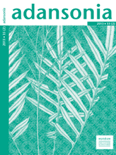
ADANSONIA
Unveiling the complexities of plant life worldwide.ADANSONIA is a distinguished, peer-reviewed open access journal dedicated to advancing the field of plant science. Published by the Publications Scientifiques du Museum in Paris since 2000, this journal serves as a critical platform for sharing innovative research and discoveries in botany, ecology, and related disciplines. With its ISSN 1280-8571 and E-ISSN 1639-4798, ADANSONIA boasts a notable Scopus rank of #383 in the Agricultural and Biological Sciences category and a 2023 category quartile ranking of Q3 in Plant Science, indicating a meaningful contribution to the academic community. The journal's scope encompasses a broad range of topics, making it a vital resource for researchers, professionals, and students alike who are exploring the complexities of plant biology. Based in France, ADANSONIA not only enhances visibility for groundbreaking research but also facilitates open communication amongst scholars, ensuring that knowledge on plant science is accessible worldwide. Located at CP 39-57, Rue Cuvier, F-75231 Paris Cedex 05, France, this journal stands as a testament to the collaborative efforts in the pursuit of scientific excellence in plant sciences.
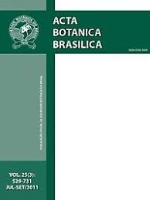
Acta Botanica Brasilica
Championing Ecological Understanding and ResearchActa Botanica Brasilica is a prestigious open-access journal dedicated to the field of botany and plant science, published by SOC BOTANICA BRASIL. With an ISSN of 0102-3306 and E-ISSN of 1677-941X, it has been a vital resource for the academic community since its inception in 1987, fostering the dissemination of research and knowledge related to plant biology and ecology. Hailing from Brazil, the journal serves as a platform for researchers to share valuable insights on plant species, their habitats, and important ecological interactions. As of 2023, the journal holds a Q3 ranking in Plant Science and is recognized within the Scopus database, where it ranks #263 out of 516, placing it in the 49th percentile among its peers. This broad accessibility and commitment to quality research make Acta Botanica Brasilica an essential publication for botanists, ecologists, and other professionals in the life sciences, bridging gaps in knowledge and advancing the field with original articles, reviews, and comprehensive research findings.

Mediterranean Botany
Unveiling the Secrets of Mediterranean BiodiversityMediterranean Botany is a distinguished peer-reviewed journal dedicated to the flourishing fields of Ecology, Plant Science, and Ecology, Evolution, Behavior and Systematics. Published by the Universidad Complutense de Madrid, Servicio Publicaciones, this Open Access journal has been disseminating valuable research since 2018, ensuring that findings are accessible to a global audience, with an emphasis on Mediterranean vegetation and biodiversity. With an ISSN of 2603-9109, it contributes significantly to the academic discourse in its category quartiles, recently featuring in Q3 for Ecology and related fields. Notably, Mediterranean Botany ranks within the top half of its category in Scopus, highlighting its relevance and contribution to the scientific community. Researchers, professionals, and students alike will find the journal to be a vital resource for latest discoveries, trends, and conservation strategies in Mediterranean ecosystems, positioning it as an essential platform for advancing knowledge and fostering collaboration within the plant sciences.

Annali di Botanica
Advancing botanical knowledge for a greener tomorrow.Annali di Botanica is a distinguished journal published by UNIV STUDI ROMA LA SAPIENZA that has become a vital platform for advancing research in the field of plant sciences. With its Open Access policy established since 1995, it ensures that a wide audience including researchers, professionals, and students can access high-quality, peer-reviewed articles that contribute to the global body of botanical knowledge. As of 2023, the journal holds a Q3 rank in the Plant Science category, reflecting its commitment to scholarly excellence and relevance, as evidenced by its position within the 62nd percentile of activities ranked in Scopus. The journal encompasses diverse topics in botany, fostering discussions that encompass morphological, ecological, and genetic aspects of plants, effectively bridging theoretical knowledge and practical applications. Situated in the heart of Rome, Italy, at PIAZZALE ALDO MORO, 5, the journal not only addresses regional botanical issues but aims to serve a global audience, enhancing collaborative efforts and stimulating innovation across the botanical sciences.
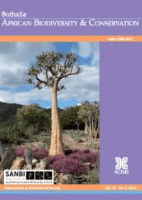
BOTHALIA
Unveiling the mysteries of nature's systems.BOTHALIA is a prominent open-access journal dedicated to advancing the fields of Ecology, Evolution, Behavior, and Systematics, as well as Plant Science. Published by the South African National Biodiversity Institute (SANBI), this journal has been disseminating valuable research since 1978 and has embraced open access since 2014 to enhance the visibility and accessibility of scientific knowledge. With an ISSN of 0006-8241 and E-ISSN of 2311-9284, BOTHALIA plays a pivotal role in promoting biodiversity research in South Africa and beyond. In the recent Scopus rankings, it has been positioned at Q4 in both relevant categories, highlighting its contributions within the broader scientific community, despite being in its growing phase amidst competitive rankings. The journal aims to publish high-quality articles that address critical issues in biodiversity and ecological sciences, making it an essential resource for researchers, professionals, and students committed to understanding and managing our planet's biological heritage.

GENETIC RESOURCES AND CROP EVOLUTION
Bridging Genetics and Ecology for Enhanced Crop ResilienceGENETIC RESOURCES AND CROP EVOLUTION is a leading academic journal dedicated to the exploration and advancement of genetic resources in agriculture, evolutionary biology, and plant science. Published by Springer in the Netherlands since 1992, this journal aims to foster a greater understanding of the genetic basis of crop evolution and diversity. With a robust impact reflected in its Q2 status in multiple categories, including Agronomy, Ecology, and Plant Science, it ranks impressively within the top quartiles of its fields. As of 2023, it continues to be an essential resource for researchers, professionals, and students who seek to enhance sustainable crop production and biodiversity conservation through innovative genetic methodologies. The journal promotes high-quality, peer-reviewed research that contributes valuable insights into the genetic adaptation of crops in response to environmental changes. While the journal is not open access, its esteemed reputation ensures that the insights it provides reach a wide audience eager to address some of today's most pressing agricultural challenges.
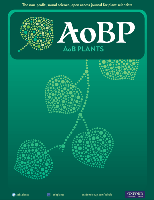
AoB Plants
Empowering discovery in plant biology and ecology.AoB Plants is a distinguished open-access journal published by Oxford University Press, dedicated to advancing the field of plant science. Since its inception in 2009, this journal has played a pivotal role in disseminating high-quality research that encompasses a wide range of topics including plant biology, ecology, and biotechnology. With an impressive impact factor and a ranking in the Q1 quartile for Plant Science, AoB Plants is recognized for its innovative contributions and scholarly rigor, ranking #129 out of 516 in the Scopus Agricultural and Biological Sciences category, placing it in the 75th percentile among its peers. By promoting open-access availability of research findings, the journal empowers researchers and practitioners alike, facilitating greater collaboration and knowledge sharing in the global scientific community. Situated in the heart of the United Kingdom, AoB Plants continues its commitment to providing a platform for pioneering research and developments in plant science, thus fostering a deeper understanding of the crucial roles that plants play in our ecosystems and economies.

ACTA SOCIETATIS BOTANICORUM POLONIAE
Exploring the Depths of Botanical Knowledge Since 1923ACTA SOCIETATIS BOTANICORUM POLONIAE is a reputable open-access journal dedicated to the field of Plant Science, published by the Polskie Towarzystwo Botaniczne since 1923. With an ISSN of 0001-6977 and an E-ISSN of 2083-9480, this journal has made significant contributions to the botanical sciences, fostering the dissemination of research from Poland and beyond. The journal has ranked in the third quartile (Q3) within its category in the 2023 journal metrics, demonstrating a strong presence in the global academic community, as evidenced by its Scopus ranking of 291/516 within the Agricultural and Biological Sciences sector, placing it in the 43rd percentile. While specific H-Index data are currently not available, ACTA continues to attract submissions from a broad international audience and publishes a wide range of studies that advance the understanding of plant biology, ecology, and conservation. The journal remains a vital resource for researchers, professionals, and students alike, committed to enhancing knowledge and collaboration in botanical science.

PLANT SPECIES BIOLOGY
Fostering Interdisciplinary Dialogue in Plant SciencePLANT SPECIES BIOLOGY, published by WILEY in the United Kingdom, is a prominent journal dedicated to advancing the understanding of plant species, their biology, ecology, and roles within ecosystems. With an impressive convergence of research dating back to 1986 and extending through 2024, this journal caters specifically to specialists in the fields of plant science and ecology. The journal's current impact factor further underscores its significance, ranking in the Q2 quartile across three relevant categories: Ecology, Ecology, Evolution, Behavior and Systematics, and Plant Science. As a member of the Scopus ranks, it holds respectable positions within its categories, evidencing its contribution to impactful scientific discussions and knowledge. Although it is not an open-access journal, PLANT SPECIES BIOLOGY provides essential insights, fostering interdisciplinary dialogue and discovery for researchers, professionals, and students dedicated to exploring the complexities of plant species and their ecosystems.
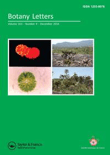
Botany Letters
Innovating for Tomorrow’s Agricultural ChallengesBotany Letters, published by Taylor & Francis Ltd, is a prominent journal in the field of Plant Science based in the United Kingdom. With its ISSN 2381-8107 and E-ISSN 2381-8115, the journal has established itself as an essential resource for researchers, professionals, and students alike, focusing on innovative studies and findings in botany. As a Q2 ranked journal in its category (2023) and holding a respectable Scopus rank of #200 out of 516 in Agricultural and Biological Sciences, it reflects a robust commitment to quality and relevance in the field. The journal's open access model ensures that groundbreaking research is readily accessible, fostering collaboration and knowledge sharing among the global scientific community. Covering a broad spectrum of topics within plant science from 2016, Botany Letters aims to catalyze advancements in the understanding and management of plant biodiversity and sustainability, ultimately contributing to conservation efforts and agricultural innovation.